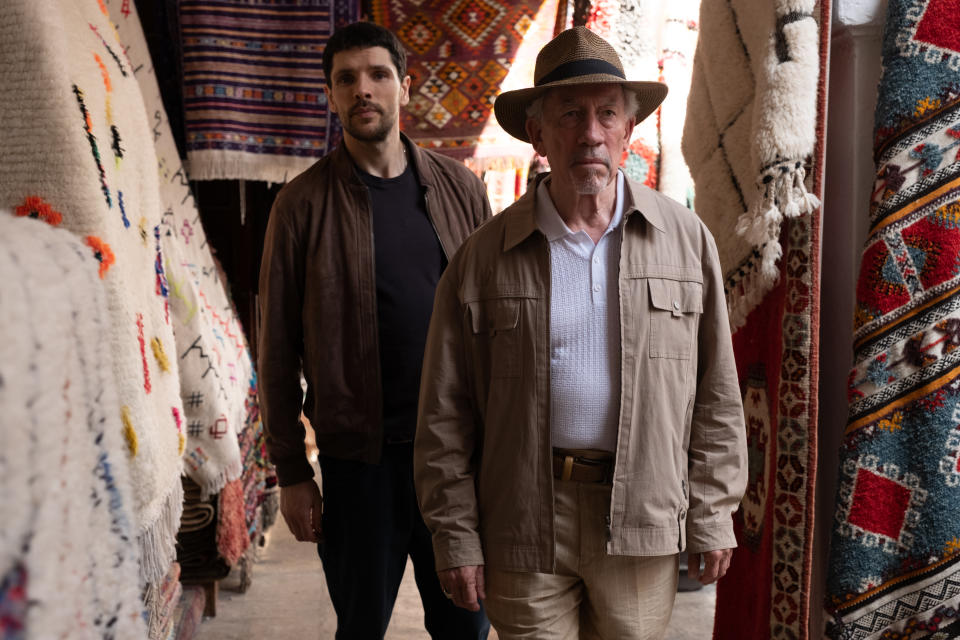“It’s Been A Hell Of A Year”: How The Streaming Reset Forced Distributors To Get Creative — London TV Screenings

Such has been the chaos in international TV over the past 12 months that you could argue Cineflix Rights’ Head of Scripted, James Durie, is underplaying things when he says it has been “a hell of a year.”
Distributors around the world have watched on in horror as the streaming sector crumbled and the crashing TV ad market decimated budgets at commercial nets everywhere, not to mention the license fee woes being experienced by the likes of the BBC. Redundancies, cost saving and restructuring took hold, and the likes of Paramount, Disney+ and Prime Video have cut back on international originals, in some cases brutally culling non-U.S. shows.
More from Deadline
In recent months, international scripted projects from countries such as the UK, Canada and Australia that would have been viable options for the U.S. streamers have suddenly been seen as big gambles. The sense that co-production agreements with streamers could be struck faded into dust, while linear networks kept their hands in their pockets or came to the table with reduced budgets.
The knock-on effects for a distribution industry that had experienced nothing but more and more product hitting the market for years have been felt deeply. Even global acquisitions deals, which really kicked off the streaming revolution in the early 2010s, have been largely off the table, with only Netflix’s LA team and Apple consistently cited by sources as potential buyers. In general, lower-priced local territory deals have replaced them.
It hardly needs saying that the labor strikes in Hollywood have exacerbated the situation, slowing down development and investment pipelines. Many sources claim streamers are now commissioning by committee out of LA, while risk taking — especially on international projects that lack big talent packages — is completely out of the question. Should a distributor desperately need a non-U.S. show to enter production, they might end up shouldering half the costs. It’s not the position they want to be in.
Ampere Analysis stats released just this week showed that the market for first-run commissions has fallen as much as 40% globally from its peak in Q4 of 2020, when demand for content exploded during the Covid crisis and the big streamers were ramping up in a race for subscriptions. It all combines to pose distributors an almighty headache, sources tell us.
“It’s been like continuously sparring in a boxing ring and people are punch drunk with the changes,” says the boss of one major international distributor.
Adapting — once again
Those of us who’ve tracked the international distribution world for any length of time know that TV content sellers are defined primarily by one unifying trait: adaptability. And adapting is what the past year has been all about, especially in scripted, where new co-production models and innovative funding structures are emerging to ensure new dramas hit the market. At the London TV Screenings next week, we’ll begin to see how successful they’ve been.
Cineflix’s Durie says: “The one thing I’ve realized is that if you can shut out the noise and go back to the source, the viewers have been weaned on high-end scripted drama and they really want more of it, and they don’t really care about how it gets funded or where it gets produced. Our job is to pick and choose the right shows and the right collaborative producers, and double down on them.”
Cineflix, a Canadian-based company with a sales head office in London, will be in town with one of the buzziest international drama titles currently in development: Leonard Cohen limited series So Long, Marianne, which follows the legendary Canadian musician’s relationship with muse Marianne Ihlen. It stars Oppenheimer‘s Alex Wolff and The Last Kingdom actress Thea Sofie Loch Næss.
The series’ financing points to the lengths savvy commercial and creative minds will go to get interesting concepts into production and on screen. When we first told you about So Long, Marianne nearly two years ago, it had been ordered by Norway’s NRK, with the decision largely down to its country connection to Ihlen. The UK’s Buccaneer Media (Marcella, Crime), which Cineflix part owns, and Lilyhammer writer Øystein Karlsen’s Redpoint Productions boarded to co-produce, along with Connect3 Media — another firm with direct connections to Cineflix. Canadian streamer Crave joined thanks to a local fascination with Cohen, and with most of the action set on the picturesque Greek island of Hydra (where Cohen and Ihlen lived during the 1960s), Greece’s Tanweer Productions later became another piece of the co-production jigsaw puzzle. Things were complicated.
Further co-financing came from Nordic pubcasters SVT, DR, Yle and RÚV (according to local reports), along with tax incentives from Canada and Greece, and support from the Norwegian Film Institute and Creative Europe. The UK’s ITVX, Greece’s Cosmote TV and Germany’s ARD were also among pre-buyers.
Durie says the show provided a “natural co-production” opportunity, which taps into the demand for high-end drama. “That’s a good blueprint for funding a show and getting it into production,” he adds.
‘Thumbnail war‘
So Long, Marianne is one of several European or UK projects set to screen next week that point to a market that’s becoming more reliant on agile dealmaking, soft money, co-productions, local tax rebates and, often, hefty deficit funds. Many are talking with production financiers and even considering the spectre of private equity money entering the space — not ideal for either producers or distributors who see their cut drop every time a new party is introduced.
Abacus Media Rights will be in town with The Boy That Never Was, which provides one such example. The Irish RTÉ drama is based on a bestselling novel, creatively led by Harry Wild pair Jo Spain and David Logan, with financial support from Screen Ireland. Pre-sales have already been secured in the UK and France and shooting took place in Ireland and Morocco, both of which have generous filming incentives. Elsewhere, Scandinavia’s Eccho Rights will be bringing Fallen, a YA fantasy series from U.S. showrunner Matt Hastings that was made using an indie financing model more akin to the film industry. After securing Brazil’s Globoplay as co-producer, alongside Eccho parent Night Train Media and Swiss TV and film financier Silver Reel, shooting took place on location in Hungary, meaning the production could access the country’s generous 30% tax rebate.

There were murmurings Eccho would hit London with early footage from another uniquely built drama, Safe Harbor, but we hear this is now being held back for a wider launch, likely at Mipcom Cannes in October. That show is also instructive for how projects will hit the market in future. Commissioned by Dutch and Belgian streamers, it has the star power of Game of Thrones pair Alfie Allen and Jack Gleeson, and Peaky Blinders‘ Charlie Murphy. Ozark co-creator Mark Williams is directing along with award-winning Dutch director Arne Toonen. More big name stars will be cast and co-producers comprise Night Train, the Netherlands’ Submarine and Williams’ Zero Gravity. Eccho has international sales rights and is slowly seeding it to the market.
“It’s all about diminishing risk through talent, and mostly talent on screen,” says Eccho’s Director of Co-productions, Acquisitions and Development Adam Barth. “We’re looking where we can to get the best package for the key art — we have to give platforms the tools to be excited about our project.”
Cineflix’s Durie calls this a “thumbnail war” that has made talent and IP more vital than ever. “If a title and the talent is known, the marketing teams have already won their battle,” he adds.
Banijay Rights’ U.S.-based EVP of Sales, Acquisitions and Co-productions – World, Matt Creasey, makes a similar point: “Talent is so important. It just mitigates risk and nobody wants to take risk at the moment. What stands out on a billboard matters, and so the slightly esoteric, risky, character-led show is much harder to co-produce at the moment. Instead, we’re going to see the more propulsive drama: glamorous international destinations, action and stars. The rooms I’m sitting in are all saying the same thing in LA.”
It’s no wonder, therefore, that Banijay’s slate for next week is top lined by Wolf Hall: The Mirror and the Light, the follow up to the 2015 Golden Globe-winning miniseries about a scheming Thomas Cromwell in 16th Century England. Returning after nearly a decade are stars Mark Rylance and Damian Lewis, with creators Peter Straughan and Peter Kosminsky once again behind the wheel. The grandeur of the project has made it one of the standout titles for the Banijay @ BAFTA showcase.

Deficit funding
One big issue that several usual U.S. players retrenching from co-productions has created is that budget gaps can get passed on to distributors, who are forced to make even bigger upfront investments than before, find more partners or ditch projects altogether. “People are sometimes asked for 60% of the budget,” says Eccho’s Barth. “Even if I had the power to do that deal, I wouldn’t see another penny on it.”
Creasey reports that Americans are keen on U.S.-anchored projects, but that in countries such as the UK shows are struggling to get funded even after a greenlight from a local partner. There are exceptions — MGM+ (then Epix) boarded Banijay’s BBC series SAS: Rogue Heroes, for example — but the British terrestrial networks no longer have the capability to increase tariffs in line with budget inflation.
“The pain has been falling on distributors of scripted,” says Julie Meldal-Johnson, EVP of Global Content at ITV Studios, which is hitting the London TV Screenings with shows such as ITV true crime drama A Cruel Love: The Ruth Ellis Story.
Creasey says that co-production business remains good in Europe and Australasia, but “even the greatest deals in those territories don’t add up to the big U.S. deal,” adding: “I will always argue that if you are deficit funding a drama out of the UK, you can’t recoup without a U.S. sale.”
There is also debate about streamers’ strategies on a local territory basis. One UK-based distributor sums a read we’ve heard several times: “The local buyers’ remits are almost to be a glorified catch-up service, and you take what you can get for a secondary sale in the home territory.”
Having a streamer promoting your show at home isn’t necessarily a bad thing, though. Notable for this is Netflix Italy, which acquired local rights to Rai’s record-setting crime drama The Sea Beyond and helped amplify its success with younger audiences. We understand the streamer is planning to follow the same strategy with period drama Bel Canto. France’s Newen Connect is expected to be in London next week with some early materials for the high-profile show, which comes from producer Lucky Red and has shades of Bridgerton in its DNA.
“When we first read the script, we thought it exactly matches what we’re looking for: Big production values, comparable to massive epic shows in the Newen catalog,” says Newen Connect CEO Rudolphe Buet.

So, many problems face distributors heading to London next week, but what are the solutions?
ITV Studios’ Meldal-Johnson cites the “advantage of being a vertically integrated broadcaster.” That provides in-house pipeline to her sales team, and occasionally a mega-hit such as Mr Bates Vs the Post Office, which was for the ITV network and co-produced by ITV Studios. We hear several finished tape sales are close to signing.
But beyond that, she says it’s a case of getting selective. “With costs of production having gone up sharply over recent years, we as distributors have seen production deficits grow so much bigger and we have to take some big swings. We will continue to do that, but it might be fewer, bigger, better.”
Meldal-Johnson notes budgets are “interrogated with a rigor that they might not have been a few years ago,” and says broadcasters will have to be prepared to give up certain windows if they cannot fund at specific levels. “There’s an appetite to look at windowing and sharing in a way that hasn’t happened in a long time. It doesn’t always result in it, but at least people are considering it.”
Durie says flexibility is key: funding is available if you know where to look. Cineflix is working closer with local funding bodies such as Screen Australia, Screen Yorkshire and Screen NSW, which can provide “a huge portion” of a budget, or with local broadcasters in countries such as Canada and Australia who can tap nations’ funding bodies. Shooting in countries with tax rebate systems is nothing new, but remains vital for many titles.
Another option is working with production partners who can offer multiple services, from development through to post, editing and local tax credit access. For example, Cineflix sells Reginald the Vampire, whose second season debuts on Syfy on May 8 and whose maker is Thunderbird Entertainment’s Great Pacific Media (GPM). Hulu has a second window in the U.S. and Bell Media is the the Canadian partner. Canadian tax credits helped the vampire comedy enter production.
“We can shoot in Canada, which is an advantage,” says Jennifer Twiner McCarron, CEO and Chair of GPM parent Thunderbird. “We’re also very nimble and known as a high quality, Canada-domiciled studio. We can partner in different ways, we have robust IP and can service shows.” It’s an enticing sounding pitch for distributors and broadcasters, and speaks to the fact that scripted content is difficult to finance right now. “There are almost no easy ones any more,” ITV Studios’ Meldal-Johnson declares.
For Banijay Rights’ Creasey, words from his boss, Cathy Payne, have been ringing in his ears as he considers the future. “Cathy always says that the market will tell you what projects are going to get picked up,” he says.
There’s a degree of comfort in that.
Whatever sales houses are facing in this current period, the cyclical nature of the industry and the knowledge business is out there for those willing to put the work in can nullify the fear.
Still, it has been a hell of a year.
Best of Deadline
Hollywood & Media Deaths In 2024: Photo Gallery & Obituaries
2024 Premiere Dates For New & Returning Series On Broadcast, Cable & Streaming
Berlin Film Festival 2024 Red Carpet: 'Seven Veils' Premiere On Day 7
Sign up for Deadline's Newsletter. For the latest news, follow us on Facebook, Twitter, and Instagram.


